Kristen Stewart has arrived in Cannes for what feels like the umpteenth time. But this edition is different – this time, she’ll be walking the red steps as a director premiering her feature directing debut The Chronology Of Water, a movie that has taken her half a decade to get made.
It’s been suggested in the press that Stewart may have had the resources to fund her own film, but the actor has a visceral reaction to the prospect of doing so: “No fucking way. Never do that.” She deserves the money, she says, and there are people out there who finance movies, so why should she?
Stewart has, however, paid out of pocket to bring her entire crew to the south of France to celebrate the film, and has “absolutely no trepidation” going into tonight’s (May 16) world premiere. “The movie is so welcome to be loved or hated, interacted with in an honest way,” she tells Screen.
Debuting in Un Certain Regard, Chronology is a moving adaptation of Lidia Yuknavitch’s eponymous memoir, which uses a non-linear approach to detail her experiences surviving sexual, physical and substance abuse to eventually become a writer. It’s the kind of raw, corporal female story that sends financiers running for the hills, jokes Stewart. But in making it, the star – who earned her first Oscar nomination in 2022 playing Princess Diana in Pablo Larraín’s Spencer – felt she was unbottling a “cumulative female experience” that’s rarely brought to light.
UK actor Imogen Poots plays Yuknavitch, baring everything for a role that bonded her and Stewart like “sisters”. The film’s producers include CG Cinema International, Scott Free, Nevermind Pictures, Forma Pro Films and Fremantle. Les Films du Losange handles international sales.
Stewart caught up with Screen ahead of the Cannes premiere of Chronology.
How did you happen upon Lidia Yuknavitch’s memoir initially, and what about the material made you think, ‘This is what I want to do next’?
In retrospect, I have to thank the algorithm, because it was a title that was suggested to me by my Kindle, and the experience of reading it felt like a call to arms. The book is a real choose-your-own-adventure series. It’s exceptionally non-linear, but so emotionally cohesive. It feels very much like what it’s like to have a subconscious that guides you, and it’s a distinctly female experience to allow your inner voice to be something that echoes inside you, but doesn’t necessarily resound externally. I felt like I wanted to join the club when I read it, and I felt totally called out in numerous ways.
Being in service of other people’s visions is my absolute favorite thing to do. It has been my whole life. We have all these secrets and [Yuknavitch] was telling all of our secrets. You know, we get our periods: don’t say anything. Don’t mention it. You get pregnant: don’t mention it until six weeks, because you wouldn’t want people to know, in case you lost it. Everything about the cumulative female experience is largely bottled up. And I felt like this could be such an exciting thing to share because it takes a very unflinching, glaring look at our crevices and our “secrets,” which are imposed. It just felt really titillating and exciting to imagine watching a female ejaculation, and putting that on screen and making it something that did not feel confronting, but that felt celebratory. There’s so much sexuality in it, but there’s also the release and potent honesty. It felt like I was one of many, many, many people that must have read it and gone, “Me! Mine! Me, too!”
It does feel so exposing in many good ways. You’ve said this movie took you five years to make. Is part of the reason why it took so long because people are afraid of going anywhere near women’s stories like this?
Absolutely. It was a difficult film to finance because in a slug line it’s “a woman overcomes sexual, physical and substance abuse”. There’s radical feminism in it. There are all these keywords that make people go, “Ew, I don’t know. I don’t know if we can market that! I don’t know how many people are going to want to pay to be dragged through that type of hell!” I’m not saying it’s going to be a huge box-office hit. That’s definitely not the goal. But I do know that it has fellows. I know for a fact that if I feel this way, I could not possibly be alone.
Did you ever feel pressure to star in the film yourself? Would that have made it easier to finance?
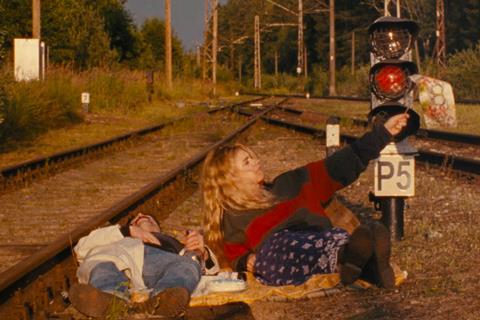
It was never pushed. I will say, other, more “bankable” actresses were encouraged. But I was working with producers that are artists and cinephiles, and the facts were laid out. It would have been a lot quicker – a lot easier maybe – to hire [a “bankable” actress], but that list is so small, and it’s so absurd and random to me, and it changes.
I don’t know. Lidia is a little forest animal, and she is all woman. I’m a bit too much of an arrow for that. I just didn’t really see myself in the role. And there are parts that I had to take my hands off and understand that Imogen is Lidia… Putting that into someone else’s hands was a trip sometimes, because it was like, how would I do [it]? It was never the right question to ask. In fact, it was disruptive. And because I wrote the script over a long period of time – I had a scene version of every page of the book – and then it distilled and dwindled and changed over years, and when I invited Imogen onto this, it took on a complete and utter life of its own.
So, in terms of getting it financed, and who the right person was, it was kismet. [Poots] happened to be ready to make this radical [movie]. Because we’re ageing child stars, do you know what I’m saying? We’re not willing to always relinquish the protective natures that we have, or the controlling natures that might prohibit us from going deep into work, and it takes the right person to unlock that. We are now fucking sisters and we both had experiences together that we get to share. I’m so happy to have a film as a result.
Has it changed the way you think about the industry?
Yeah. I could never work within the studio system. I’ve done it as an actor a couple of times. And I never want to put stuff like this in print and have people then glom onto it like, “She’s done with something!” I’m never making full-stop statements about anything. We change every day. But I could never do anything that didn’t feel like it came from the very pit of me. It took an unbelievable amount of audacity mixed with utter inexperience for me to think that this was possible, with the amount of money that I had and the time that I had, and where we did it. I have absolutely no trepidation in going into [the film’s premiere]. The movie is so welcome to be loved or hated, interacted with in an honest way. I welcome it.
In terms of what it made me feel or understand about our business now, and what’s allowed to be made and who’s allowed to take up space, and what makes money? I don’t know about that kind of shit at all. I’m a bad planner. I’m present to a fault. But it saves me sometimes because I think the movies that I have in me – the ones that will rise to the surface – just have a volition. This one did. Even though it took a long time, it was something that I wasn’t going to stop until it happened, because there was just no other reason to live. I know that sounds so histrionic. That’s not faux drama: that is real heart drama. I’m being dramatic for a good reason.
Did you invest any of your own money to make the film?
No! No fucking way. Never do that.
So, there was a line drawn there.
Yeah, because I deserve it. And we deserve it. And that’s crazy. I mean, financially speaking, I do things that other people probably couldn’t do, like I brought my entire crew with me to Cannes, and we’re just in Un Certain Regard. It’s not like we’re in main Competition. It’s kind of unheard of. I’m so lucky to be able to do certain things that smaller productions just wouldn’t be able to do. If I said this to my producers [that I want to bring everyone to Cannes], they’d be like, “No fucking way, but have at it.” And so I have every department head with me, I have my family. That’s the kind of stuff that I’m lucky enough to be able to finance.
But in terms of financing my own films? No. There are people that do that, and that would be such bullshit. We deserve it. And when I say “we,” not to lump us all together, because I also have an issue with that. But stories like this, and girls my age – I’ve been doing this forever. I’m 35 years old. Let’s fucking go. Are you kidding me? This is not something that I should have to fight so hard for. And hopefully now I won’t have to, but maybe I will. You never know. The way the world is turning, this movie may be more radical than I even thought it was when I first started. And when I say radical, [I mean] more vital.
Speaking of the way things are going, you filmed in Latvia and Malta, presumably because it’s cheaper to film overseas. What do you make of President Trump’s tariff threat against Hollywood and movies that are made in “foreign lands”?
I’m always wilfully in denial. I’m always like, “That’s not gonna happen. No fucking way. It doesn’t seem real.” And then the most unreal things happen, and they happen over and over lately, to the point where reality has broken for me and for all of us. I really wanted to make the movie in the States. It takes place in the Pacific Northwest. I wanted to be in Washington and Oregon. The movie spans four decades. But it’s not something that people want to pay for. So, my producer, Charles Gillibert [president of Les Films du Losange], is French and somebody I’ve worked with since I was 18. He heard me stamping my feet in public and throwing temper tantrums to the press about the fact that I just couldn’t make this happen. And he was like, “Unfortunately, you have to come to Europe.”
And what do I make of the tariff situation? I truly actually just can’t. There’s just such an unbelievable hypocrisy that’s happening. It’s like, “Make everything here, but also, you’re not allowed to say anything that we don’t want you to say.” And everyone is fueled by that, because we live in a capitalist society, and nobody wants to lose all their money. I do think that, now that I’ve done this, I want to do a Cassavetes moving forward. [Director John Cassavetes] financed most of his own movies, but I want to scrape together a DIY, local, respectful, communal approach that does not bloat and leak. Our business is so bloated and leaky, and if we can just do it with our hands and keep it in the family… Let me put it this way: I’m working on figuring out how to make movies outside the system, but still stay home and just do it fully off the grid.
Even in terms of subject matter, and the kinds of stories that get to be told now, it feels like a challenging time to be working in the US right now.
It feels pretty authoritarian, doesn’t it? I mean, to even say anything in public. Our interactions with speaking to each other in public is changing by the day. And it’s moving so quickly. It’s impossible to not have ultimate whiplash.
Do you ever feel like moving away? Maybe to Europe, and making your films here?
I don’t know. I have my whole family [in the US]. It’s something that we talk about all the time – escape plans. And honestly, history repeats itself, and when it’s too late, it’s too late, and it happens in a split second. You don’t know it until you’re there. So that is scary. Systems have fallen and broken and fucked people in the past, really recently. It’s time to stay hyper-vigilant and honest with ourselves. I don’t want to say that I just want to jump ship, because I do have hope. I’m an angry optimist, and I just don’t think something like this could last forever. I don’t think people are happy, and I’m so happy to see a little more disillusionment lately. But our system’s young and it’s not working. I don’t know what comes next. I’m happy to not be younger than I am. I’m scared for people.
Do you have a dream project that you’d like to do in the future? A book, or an article or any kind of IP that you’d love to make one day?
There are a couple things. Me and [my wife, screenwriter and producer Dylan Meyer] have written the first draft of something that we do have the IP on, and I’m not allowed to tell you what the fuck it is, and I really wish I could. But I’m also writing something by myself right now that pertains to the reality break. It’s a smaller, more contained movie about three people who are very, very close, but are inhabiting different realities. There are three different ways that they lie to themselves and each other that have a lot of emotionally violent crossover. I’m kind of figuring that out now.
This movie, Chronology Of Water, is an enormous tome. My next movie is teeny tiny, and I can do it anywhere. And I know my crew now – I have my family – so I think it’s going to be a lot easier moving forward. So, yeah, I’m writing a couple of things and moving as fast as I can.

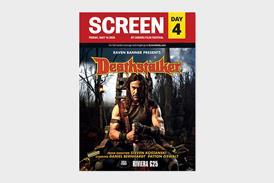

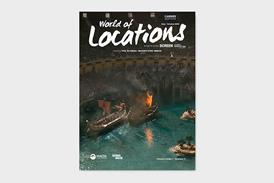

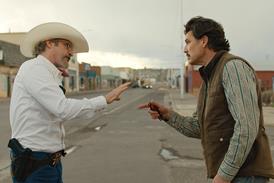
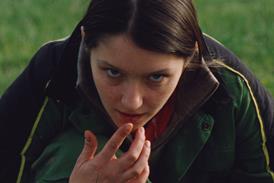




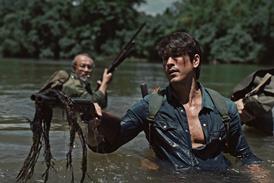
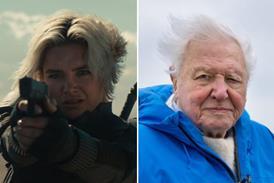
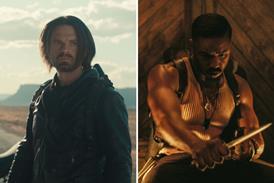




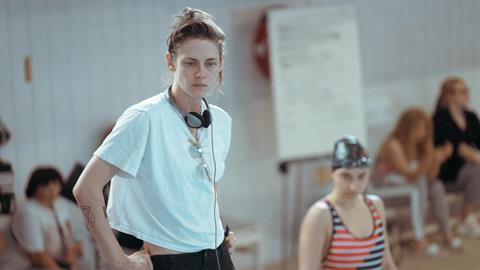






No comments yet